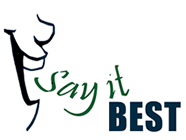
Fun Ways to Help Children Communicate and Speak Effectively
Designed by a Speech Therapist - Research Based Speech Therapy Computer Software

Fun Ways to Help Children Communicate and Speak Effectively
Designed by a Speech Therapist - Research Based Speech Therapy Computer Software
| Children who do not develop language skills appropriately at expected intervals in their growth, are language delayed or disordered. Some of the potential causes for language delays/disorders in children include hearing impairment, cognitive impairment ( such as Down Syndrome), autism spectrum, fetal alcohol syndrome, physical handicap that prevents the child from interacting with his/her environment, and lack of stimulation. There may not be an identifiable cause for a language disorder. Children can have receptive language and/or expressive language impairments A receptive language impairment is a difficulty understanding language. It involves not understanding the meaning of words, spatial concepts such as in, on, under and descriptive words such as big, little, smooth, etc. They may not understand the past tense of action verbs, sarcasm, idiomatic expressions (like "it’s raining cats and dogs") and nonverbal signals, like body language. Expressive language impairments mean that a child has difficulty in how he/she speaks. He/ she may not be able to name objects or pictures, use very few words in a sentence, or may not produce grammatically correct sentences, leaving off words like "is" and "are". They frequently do not know how to communicate in a social interaction, how to ask for something they want, or how to get someone’s attention in an appropriate manner. |
Sean’s Story Sean is a 4 year old boy. Instead of using language to express his needs and wants, he uses nonverbal communication and often becomes emotionally upset. He is bothered that his shoe is untied so he cries or grunts by pointing to his shoe. When he needs to use the toilet and has trouble unfastening his pants, he cries. If he needs the blue crayon when the children are coloring at the table, he cries or will grab it from another child’s hand. If he feels he needs attention, he cries or will hurt himself intentionally to get attention. Although he is capable of naming things, he usually does not use words to fulfill his needs and wants and as a result, spends much of his time feeling frustrated and angry. He usually plays alone as he does not know how to interact with another child. When he does interact, it’s usually because there is a conflict.As part of his speech therapy he was taught to use words to express his needs and wants in playing with a friend. When he wanted something, he was encouraged and taught how to use words and usually had such a surprised look on his face when this worked. He was encouraged to look at the person he was talking to, and wait while the other child spoke or had his turn at playing a game. |
Many children know how to talk and play with others naturally. Other children have to be taught how to play with a toy in a typical manner, how to appropriately get someone’s attention |